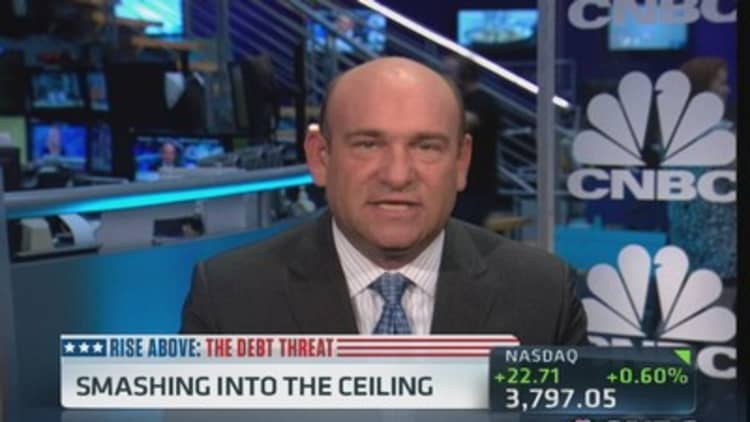
Treasury Secretary Jack Lew is about to face the very same choices confronted by any financially struggling American household: Which bills to pay and when to pay them.
If Congress fails to raise the debt ceiling by around Oct. 17, Lew, who has been in the job less than a year, will have to sit at his desk and figure out how to make due on roughly one-third less in the way of government funds for the bills he has to pay. Because he can no longer borrow, according to the Bipartisan Policy Center, government spending will fall by about 32 percent, or $108 billion in the first month.
It's like the head of a household who has a family member gone wild with a credit card: Lew will be responsible for paying the very bills that Congress has rung up, even while Congress denies him the right to borrow money to pay for them.
But there are some key differences with households: While a homeowner might juggle a dozen or so monthly bills, Lew has to figure out which of more than 100 million monthly government payments to make. Because the government payment system is largely automated, Lew can't just decide not write a check here or there. He has to figure out how to transform a system designed to pay all of America's bills in full and in a timely way, to one that pays some of its bills, and not others.
(Read more: Now you're worried, fears rise on credit default)
While a household juggles not paying the electricity or the cable bills, Lew will have to juggle not paying a retiree in favor of a soldier, or not paying the soldier in favor of sending out tax refunds.
Experts believe the government will have two choices if the debt ceiling is breached and neither looks that pleasant from Lew's perspective.
Prioritization: Under this plan, the Treasury would decide which bills to pay. That means some difficult political choices that it admittedly doesn't want to make and doesn't have the authority to make. For example, it could be forced to pay interest on the debt, but not food stamps; it could pay active duty military personnel, but not veterans' benefits. Under this plan, in about the first month of breaching the debt ceiling, the Treasury will have to decide not to pay one out of every $3 that the government is obligated to pay.
Sounds tough, but is it doable? Not according to Treasury officials. They say that the Treasury's payment system is not capable of making those choices and it would require massive reprogramming of the system. More so, they question the legality of those choices. "Treasury officials determined there is no fair or sensible way to pick and choose,'' according to the Congressional Research Service.
There is also no legal basis. Treasury officials believe Congress' laws to spend money on national parks has the same standing as the law to pay for nuclear missiles. To be sure, there is a separate payment system of the military which complicates prioritization enormously. In addition, the Treasury could run afoul, in making those choices, of laws that prohibit the administration from NOT spending appropriated money.
All of this is the mechanical and legal side of the problem. It's before the political firestorms arrive, where each constituency trumpets the national security, fairness and health and safety necessity of paying their particular bills. The heat the administration is taking now for its choices under the government shutdown will be like a matchstick compared to the political bonfires that will burn if the debt ceiling is breached.

Day-to-day: A more likely scenario is that the government would pay its bills day-by-day, that is, wait until it has enough money on hand to make a single day's payments and then punch the button and pay them all. This keeps Treasury officials from making the difficult legal and political choices surrounding prioritization.
But it's not without its problems. It will mean delays, sometimes days or weeks. The Bipartisan Policy Center estimates that in the first month, Social Security payments will be made three days late, food stamp payments five days later and active duty personnel would get their checks about 12 days late.
(Read more: 143-year-old law puts fear in officials during shutdown)
This plan, however, assumes that interest payments on the national debt are prioritized so the nation would not be in default on its debt. It's also highly variable, depending on when the government makes particular payments and whether the month includes quarterly tax payments. Months when those payments are not made could mean much longer waits. In April, when annual tax payments are made, payments would be faster.
Like the head of a regular household, Lew's choices will cost money. By not paying vendors in a timely way, the Treasury will incur late payment penalties and fees. But unlike households, the more the problem persists, the worse the situation will get. A debt ceiling breach will likely have serious economic consequences that could plunge the nation into recession. The more the economy worsens, the more tax receipts will decline and the more government obligations will increase. More Americans will qualify for unemployment benefits and food stamps. Meanwhile, government tax revenue is highly correlated to economic growth, which is why deficits spike in recession.
Lew faces few good choices and many of those choices pit one law against another. What's unclear is the legality of Lew relying on a tried-and-true tactic used at one time or another by every American check writer: "The check is in the mail."
—By CNBC's Steve Liesman. Follow him on Twitter: @steveliesman


